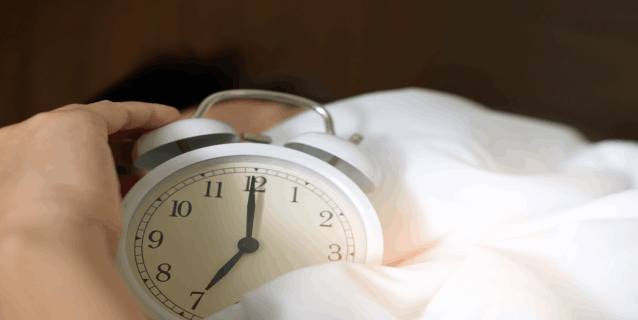Our lives are busy, often exciting, and sometimes stressful. In our pursuits, we may find conflicts within ourselves and prioritize the wrong things. Namely, our sleep schedules.
Working late, shift work, international travel, or just life in general can lead to your sleep routine being disrupted. Sunset and sunrise remain consistent, yet we vary wildly. Also, we’re often caught flipping from too little to too much sleep to “catch up”—something shown not to work effectively.
Whether that means our job is keeping our minds up late or our bodies, disrupted sleep schedules come in many forms. We’re continually told that sleep is important, but what impact does it have on us, and can we fix it?
Well, the answer to both questions is a lot.
Let’s go over the importance of sleep and fixing your sleep schedule, and then we’ll introduce five ways to sleep better and 25 actionable tips to get you there.
The Importance of Sleep
Sleep can help you maintain a healthy weight, lower your risks of serious diseases like diabetes and heart disease, perform better at work or school, and have better relationships.
While these are just some of the benefits a good night’s sleep can bring, the opposite is also true. Poor sleep schedules can have a disastrous impact on our lives.
Disrupted sleep doesn’t just make you feel grumpy and leave you with low energy, it has serious effects on cognition, immunity, and metabolism—and, when chronic, can have severe implications for your health and wellbeing.
I used to feel the effects constantly, even a single night’s upset used to have a profound impact on my ability to perform the next day.
Redressing the Balance
As we’ll see, everything comes down to balance and finding our own unique way to align body and mind as we prepare to sleep. Before looking at the actions we can take today, let’s understand the reasons for our poor sleep schedule so we don’t fall back into old habits. In this article, we’ll look at the following:
- Why is my sleep schedule so bad?
- The importance of having a good night routine.
- Circadian rhythm: what it is and its importance.
- How to fix your sleep schedule.
- How long does it take to adjust to a new sleep schedule?
- Final thoughts.
By the end of this article, you’ll understand the reasons why fixing your sleep schedule is so important and how you can take control with immediate action.
Why Is My Sleep Schedule So Bad?
Firstly, you’re not alone. Nearly 48 percent of adults have disturbed sleep three or more nights per week, and one in three, according to the Sleep Health Foundation, have at least mild insomnia.
We all have times of bad sleep when the stress of life weighs on our mind or we find our body and mind out of sync—wanting sleep but feeling like it’s out of reach.
The problem is it’s become normal. But it shouldn’t be.
Our modern lifestyle doesn’t allow for the concept of regular, peaceful sleep, but the alternative can have a silent yet serious impact on our health.
Optimal health and wellbeing come through our body’s careful balance of biological processes that can be thrown off by just a single bad night. Unfortunately, many of us don’t just get one bad night.
One major habit is, unfortunately, allowing stress to take hold of our minds. Stress, worry, racing thoughts, lamenting the past; they all put the mind in a state incongruent with sleep. But these are not the only reasons. Bad habits we adopt as they suit our lifestyles are also impacting our sleep, such as using cellphones at bedtime.
The good news is that we can redress the balance, rewire habits, and begin to fix our sleep schedules today.
The Importance of Having a Good Night Routine

Most of these issues come from our body not being able to rest, recover, and repair. Our minds need downtime, just like any other machine or system; otherwise, they become clunky and unable to function, which can have serious consequences.
You may have heard of REM sleep, the fourth stage of a cycle we move through—from light sleep to REM and back again—numerous times each night. Or at least we should do. With each cycle, our mind spends increasingly more time in REM sleep and less time in the lighter stages of sleep. During REM sleep, our minds process emotions and consolidate memories and dreams.
If the sleep cycle process is interrupted, such as when we’re woken up during the night, the process starts over again. As a result, when you experience interrupted sleep, you miss out on REM sleep most of all. Without sufficient REM sleep, your cognitive performance and emotional wellbeing suffer.
New evidence is even showing that the brain’s inability to repair effectively can increase risk factors for dementia, obesity, type 2 diabetes, high blood pressure, heart disease, stroke, poor mental health, and early death.
Sluggish, foggy, slow. These feelings associated with a poor sleep schedule are just the beginning as the downstream effects of a disturbed sleep schedule continue to be discovered and the importance of a good sleep schedule are highlighted.
To ensure our sleep isn’t interrupted and that we maximize our REM sleep time, we need to make sure that we prepare our bodies and minds in the hours before heading to bed.
Not only will creating a sleep schedule help prevent you from falling into previous bad habits, but you’ll also replace them with positive behaviors that make you feel better. With the right preparation, you’ll look forward to bedtime as your body and mind wind down together, edging you closer and closer to a comforting, dream-filled sleep.
Before we look at what to adapt, let’s understand more about the cyclical, repeating processes that impact our sleep.
Circadian Rhythm: What It Is and Its Importance
There are four biological rhythms which help regulate optimal bodily function throughout the various environments of the day. The most important with regards to sleep is the circadian rhythm. This plays a physical, mental, and behavioral role, responding to light and dark at different phases throughout the day and night. As well as sleep, it helps regulate appetite, body temperature, daily performance, blood pressure, and alertness, among other things.
Interestingly, according to the National Sleep Foundation, many people report that “a lack of sleep is linked to overeating, again, controlled by an internal hormonal balance.” This is just one example of how sleep impacts our bodies without us noticing.
Keeping these clocks running in harmony with each other and with our external environment ensures our bodies run optimally—we feel our best and can perform our best, resetting our internal clocks.
As you increasingly become tired throughout the day, this sleep drive, also known as “sleep-wake homeostasis,” is affected by numerous internal processes.
Light is one example. The brain monitors exposure to natural or artificial light and responds accordingly, assuming this relates to day or night, and prepares the body for rest or action. As the light fades, the brain stimulates the release of melatonin, a hormone that induces drowsiness. As the sun rises, the body releases the hormone cortisol, promoting energy and alertness.
Our circadian rhythm synchronizes our internal clock and external environment. By resetting our internal clock, we can harmonize with our environment, feel calmer, and be more attuned to our inner selves.
How To Fix Your Sleep Schedule

Now we know why fixing our sleep schedule is important and how our bodies respond to our actions, we can plan specific actions to reset our sleep.
There are five key areas of focus that ensure a sound sleep, and Marisa Peer, a world-renowned therapist, uses the acronym of “SLEEP” to help us move into action. “SLEEP” stands for schedule, light, eating, exercise, and preparation.
Marisa suggests you use this list as a resource.
Schedule
Create a sleep schedule. We’ve discussed our body’s 24-hour circadian rhythm, so we need to align with that.
- Sync with light and dark—Reset your sleep schedule to be as close to the natural light cycle of the day, mimicking it where possible.
- Ensure seven to nine hours’ sleep—Even if you think you can get by on five hours, slowly increase to seven to nine. Don’t expect to increase your sleep time overnight, be patient.
- Set rigid sleep times—Structured times lead to better sleep, so set a time to get in bed and a time to start getting ready for the day. Set an alarm with a single, short snooze time and use that time for mindfulness. Don’t change it at the weekend as you’ll always be playing catch-up.
- Do not sleep in—It might feel good to grab an extra couple of hours after a tough day, but that won’t help you in the long run.
- Don’t rely on “catch up” sleep—Similar to sleeping in, it’s counterintuitive, but it doesn’t help.
Light
Limit light. Light exposure, as we’ve found, is essential in regulating our sleep, but you don’t need to sit in a dark room for hours. Just consciously be aware of the light exposure and type near bedtime.
- Set light reminders—Create alarms a couple of hours before bed to change the mood of your house to reflect your evening state.
- Minimize brightness—Try using a dimmer or low-wattage lamp for indoor lighting or, even better, switch to blue light bulbs.
- Turn off electronic devices—Your mind needs to take a break at least 30 minutes before bedtime. In fact, leave them in another room. Also limit blue light filters one to two hours before bedtime.
- Sleep in total darkness—Consider blackout blinds or an eye mask.
- Wake up bright—Get some light, preferably natural, as soon as you wake up.
TIP: If you’re more of the DIY type, you also can buy a smart bulb (like Philips Hue, Emberlight, Stack Lighting, Lifx, or WeMo) that you can connect to your phone or fitness tracker to create a sunrise alarm.
Exercise
Get moving. The effects of aerobic exercise on sleep appear to be similar to those of sleeping pills.
Our bodies are made to move, yet our lifestyles often counter this natural drive.
- Fit exercise into your morning—If your goal is fat burning, get moving early.
- Aim for at least 30 minutes of moderate aerobic exercise—You may see a difference in sleep quality that same night.
- Stretch—Especially 30 minutes to an hour before bed.
- Consider exercising with friends or new groups—It could help you stick with it easier.
- Keep at it—Regular exercise is key to results, both physically and mentally.
Eating
Limit eating. Eating and drinking stimulates hormones which, as we’ve learned, impact the fine balance within our bodies.
- Avoid caffeine—People have different tolerances to coffee, which means we all take different amounts of time to process it and for the stimulant to wear off. Find your cut-off, starting with five hours before bedtime, and add it in your sleep schedule.
- Avoid alcohol—Similar to caffeine, find what works for you, but remember, alcohol disrupts your sleep schedule, it doesn’t enhance it.
- Avoid food two to three hours before bed—If you eat, your body responds excitedly; we’re trying to calm down the body and mind.
- Eat healthily—The better our internal clocks can work, the better the body can function.
- Consider aids—Such as camomile, kiwis, or almonds.
Preparation
Having a sleep routine really helps take the thought out of your day. As we near bedtime, we should habitually be changing our environment and our state of being to prepare our bodies and minds.
- Practice mindfulness before bed—Plan your “bedtime” 30 minutes early and just spend that time in peaceful silence.
- Make an inviting sleeping environment:
- Quiet.
- Cool, temperate. – link
- Dark.
- Clean, tidy.
- Relax—Include a relaxing activity before bed, such as reading or taking a warm bath;.
- Write what you need to remember/do the next day in a journal—This removes the spinning thoughts that can dominate at night and improves sleep.
- Write down your new sleep schedule—And stick to a daily routine, including as many of the above which apply to your situation.
How Long Does It Take To Adjust to a New Sleep Schedule?
The time needed to fix your sleep schedule will depend on the extent of your misaligned sleep and the underlying causes. For more extreme cases, more time will be needed, yet studies have shown that even for the worst chronic insomnia, simply including exercise can have dramatic effects in four weeks.
All the solutions laid out above are implementable today. Select a few and try them out.
Depending on how bad your current sleep schedule is, you could start to see improvements tonight and begin resetting your circadian rhythm.
Final Thoughts
Living with sleep issues can wreak havoc on our lives, but you’re not alone. Nor are you helpless.
These five methods will help you reset your sleep schedule, restore your circadian rhythm, regain your inner balance, and live a joyful life.
Finding the root cause and changing the habits associated with your sleep patterns will move you from frustrated and underachieving to feeling confident and energized enough to conquer any day.
References:
Get Enough Sleep: The Basics: Health Benefits
Mutual influence of sleep and circadian clocks on physiology and cognition
Sleep disturbances linked to abnormal deposits of certain proteins in the brain
Sleep and Chronic Disease



